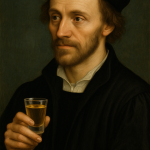
Philip Melanchthon was a German humanist, theologian, and reformer, often called the “Teacher of Germany.” A close ally of Martin Luther, he systematized Reformation theology and worked tirelessly to advance Protestant education. While Luther provided the fiery leadership, Melanchthon offered calm reasoning, scholarship, and moderation. He authored the Augsburg Confession (1530), the chief doctrinal statement of Lutheranism, and shaped Protestant thought through his textbooks, lectures, and mediation in theological disputes. Though criticized for being too conciliatory at times, Melanchthon’s role as educator, diplomat, and theologian was indispensable to the Lutheran Reformation.
Early Life and Education
Born Philipp Schwartzerdt in 1497 in Bretten, Germany, he later adopted the Greek surname Melanchthon (“black earth”) in the humanist tradition. A child prodigy, he studied Latin, Greek, and Hebrew, mastering classical languages at an early age. By age 21, he was a professor of Greek at the University of Wittenberg, where he soon met Martin Luther.
Melanchthon’s brilliance as a humanist scholar made him an ideal complement to Luther. While Luther championed reform with bold defiance, Melanchthon provided intellectual clarity and educational reform.
Role in the Reformation
Melanchthon quickly became Luther’s closest colleague, defending his theology while giving it systematic form. His Loci Communes (1521) was the first Protestant summary of theology, highlighting doctrines like justification by faith and the authority of Scripture.
He represented the Reformation at major imperial diets, including Augsburg in 1530, where he authored the Augsburg Confession. This confession, moderate in tone yet firm in its essentials, became the foundational document of Lutheran churches.
Unlike Luther, Melanchthon preferred diplomacy and conciliation. He often sought common ground with Catholics and other Protestants, hoping to preserve unity in the face of political and theological division.
Theology and Education
Melanchthon’s theology emphasized the primacy of Scripture, justification by faith, and the renewal of life through the gospel. He was less combative than Luther, open to compromise on issues like the Lord’s Supper or church ceremonies, so long as the gospel was not compromised.
His greatest long-term influence was in education. He designed curricula for schools and universities across Germany, integrating classical learning with evangelical theology. For this reason, he became known as the Praeceptor Germaniae—the Teacher of Germany.
Relationship with Luther
Melanchthon and Luther enjoyed a deep friendship, though not without tensions. Luther often praised Melanchthon’s brilliance but grew frustrated with his cautious, conciliatory temperament. Melanchthon, in turn, admired Luther’s courage but sometimes worried about his harshness.
Together, however, they provided a balance: Luther the prophet-like reformer, Melanchthon the teacher and systematizer. Without Melanchthon, the Reformation might have lacked intellectual cohesion; without Luther, it might have lacked courage.
Later Years and Death
After Luther’s death in 1546, Melanchthon became the leading voice of Lutheranism. He faced enormous challenges: internal disputes among Lutherans, pressure from the Catholic Church, and political turmoil in the Holy Roman Empire. His attempts at compromise led some to accuse him of weakness, but others saw him as a faithful peacemaker.
Melanchthon died in 1560 in Wittenberg, having spent his life teaching, writing, and negotiating for the gospel. His epitaph reflected his humility and devotion: “You are saved, Philip, not by a scholarly life, but by the death of Christ.”
Legacy
Philip Melanchthon’s legacy lies in his role as mediator, educator, and theologian. He gave Lutheranism its confessional identity through the Augsburg Confession, while his educational reforms reshaped schools and universities for centuries.
Though overshadowed by Luther in popular memory, Melanchthon’s combination of humanist scholarship and evangelical faith ensured the survival and growth of the Reformation. His balance of conviction and diplomacy remains a model of Protestant intellectual leadership.
Books on Philip Melanchthon
Philip Melanchthon and the English Reformation
By Peter Fraenkel (1961)
Explores Melanchthon’s influence on English reformers and his international impact.Philip Melanchthon: Orations on Philosophy and Education
Edited and translated by Sachiko Kusukawa (1999)
Shows Melanchthon’s role as an educational reformer and thinker.The Reformation: A History
By Diarmaid MacCulloch (2003)
Places Melanchthon in the wider European Reformation, highlighting his diplomacy and scholarship.Melanchthon: The Quiet Reformer
By Clyde L. Manschreck (1958)
A classic biography emphasizing Melanchthon’s personality and balance with Luther.Theology of Philip Melanchthon
By Robert Kolb (1999)
A scholarly exploration of Melanchthon’s theological contributions and development.The European Reformations
By Carter Lindberg (2010)
Includes a clear and accessible treatment of Melanchthon’s theology and educational reforms.Melanchthon and Bucer (Library of Christian Classics)
Edited by Wilhelm Pauck (1969)
Provides primary writings from Melanchthon and Bucer, including key confessional documents.
